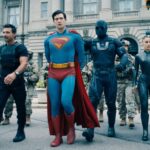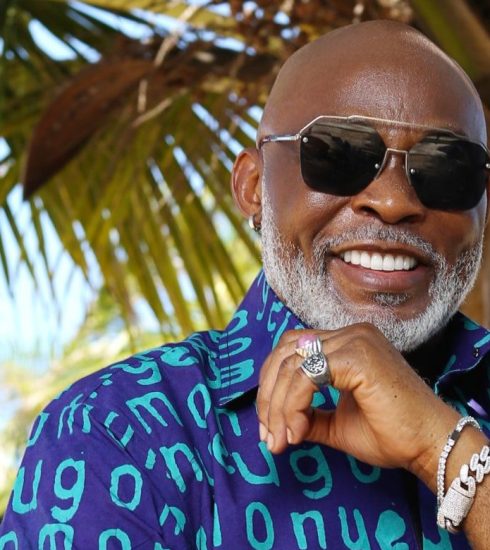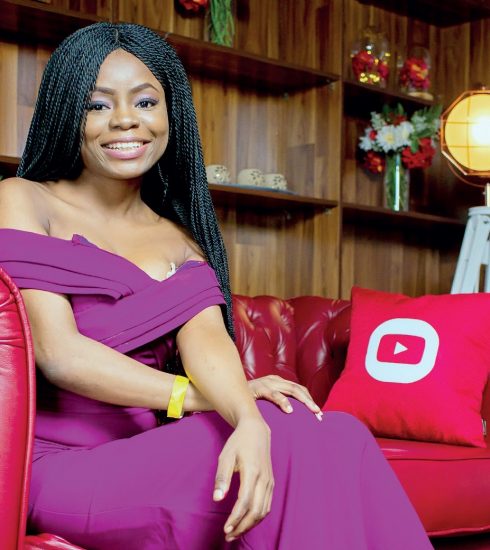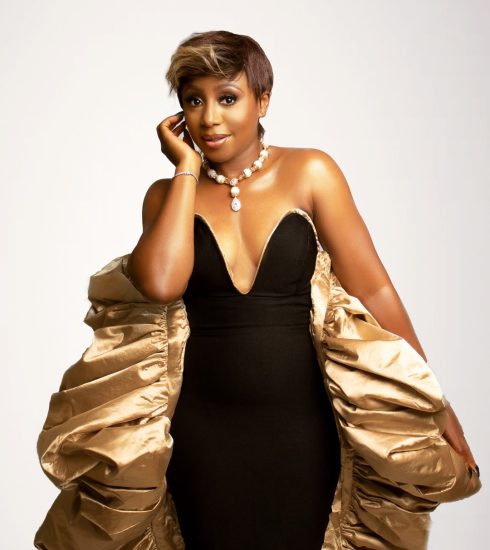Tayo Faniran: Unfiltered
In a world where power and personal gain often silence true talent, Tayo Faniran is choosing honesty.
With no fear and no filter, he praised the pioneers of Nollywood, his peers who stayed back to build the industry, and even those behind the scenes who keep things going. But he didn’t stop there. He boldly called out the gatekeepers of Nollywood to stop making decisions based on selfish interests and friendships. “Art is spirit,” he said. “Art is God’s gift.” For Nollywood to truly grow, Faniran believes it’s time to let talent speak louder than connections and personal gain.
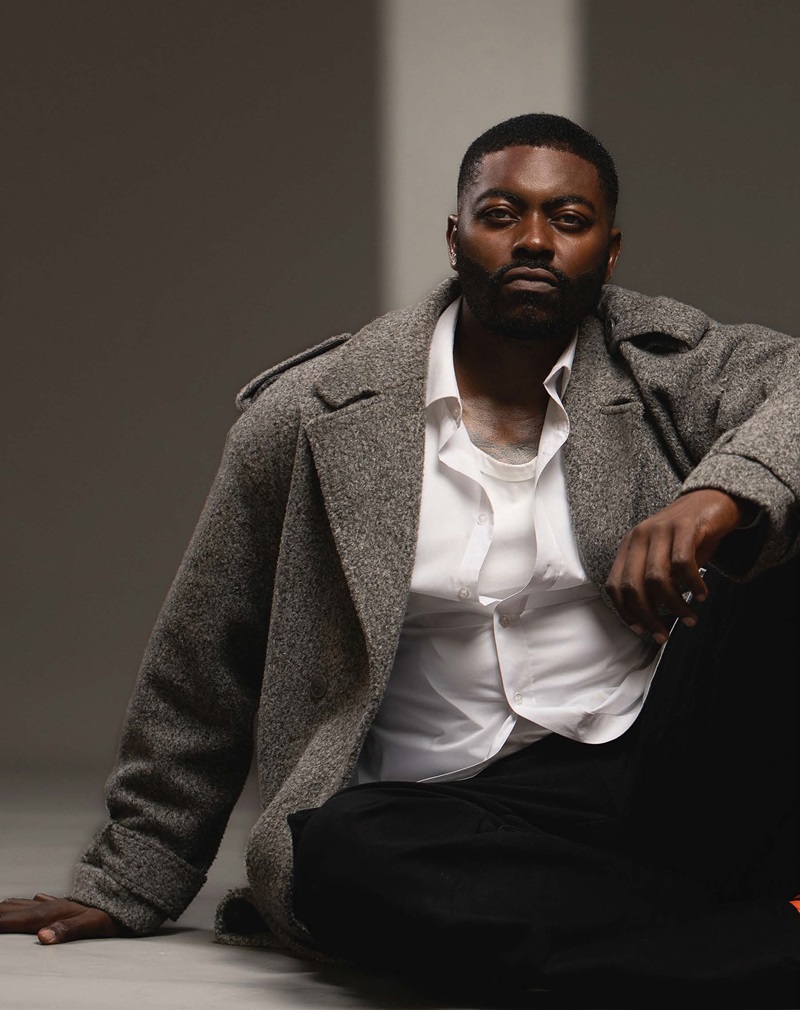
Faniran’s own story is the perfect example of what happens when purpose meets discipline. From being a top model to rising as the fan-favourite runner-up of Big Brother Africa Season 9, he has never stopped evolving. Instead of chasing only fame, he returned to Nigeria and built a new name for himself in Nollywood. With roles in Gangs of Lagos, Ada Omo Daddy, Labake Olododo, and more, Faniran proves that he’s not just talented, he’s intentional. A man of principle, passion, and presence, Tayo Faniran stands for something, speaks with conviction, carries himself confidently, and lives by his values.
In this interview with THEWILL DOWNTOWN’s Dorcas Akintoye, Tayo Faniran discusses the state of Nollywood, the need for change, his evolution as a creative, and why he believes the industry is on the verge of something bigger.
You’ve evolved so much from where the public first met you. What would you say is the most misunderstood part of your journey so far?
I feel like the story has been written, and I’m just a character in it. But so far, so good. I have a clear understanding of everything I’m doing, everything I’ve done, and everything I’ve become. I am fully aware of my starting point, how I got to where I am, and how I want to get to where I’m going. So, I don’t think I have anything in my heart that I’m harbouring. People misunderstand people every day. You can say something, and other people may misconceive it. It’s just a normal human life thing. So, I don’t think I have anything personal to share in that regard in terms of maybe something that I would say that maybe people misconceive me on.
I know that I’ve grown, and I know that I’m still growing. That’s what is important. So, there were things that maybe I used to do when I was younger, or that I used to, you know, I had some beliefs or some ideologies when I was younger. Now that I’m more mature, I mean that I’m older, I’m more mature with my ideologies and diplomacy.
I practice more diplomacy because I’m no longer a young chap. Today, I’m, like, I have to be a responsible businessman. Yeah, it’s important how I make people comfortable. Whether people are closer to me or people are far from me, it’s important to me that people feel comfortable because when I just gotten back from South Africa, and maybe like in other world or people book me for jobs and, eventually after meeting me and getting to know me, they’ll be like, oh, you’re such a sweet person. Like, we didn’t know. So, maybe people judging by picture and all of that may have a different idea of a person. And then when they meet you, eventually they realise who you are, which is normal. So, I’m good.
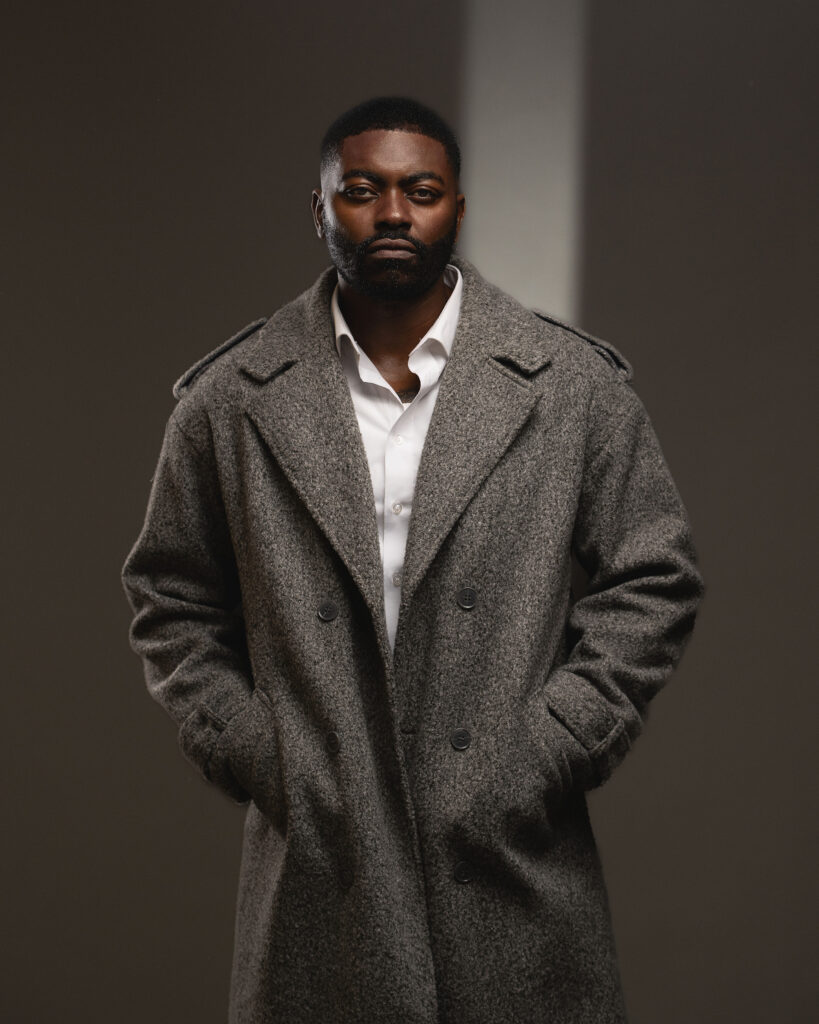
You’ve starred in major films like Gangs of Lagos and Ada Omo Daddy. What was your first acting role, and how did it challenge or affirm your talent?
My first professional acting role was Tinsel. So, as a professional model in South Africa, I was always in TV commercials. But TV commercials were always like, maybe short scripts. Sometimes they don’t even have dialogues, you know. But the first professional acting gig that I got was Tinsel. And that was right after Big Brother Africa. I remember I was with Wanky. I always say this as a Yoruba man, if I tell you that there’s fire burning on the water, I will be able to show you the ashes. So it’s not like I’m just name-dropping. But I remember in her office that year, she asked me, What would you want us to do for you? And because that time, I wasn’t even thinking of relocating back to Nigeria at all. So, I just said anything that would not make me stay in Nigeria.
So, my role on Tinsel, I knew it was temporary. I was on another TV show like that. I had a few things like that to do. But at that time, for me, it was more of a, let me just participate or let me just do it. I wasn’t too much into it that time. However, the reaction from the people I got was what made me realise that these people will think this is the best I can do.
Like, they feel like this is all I have, you know. So, I need to now start to develop myself to prove to them that I actually have a lot more. So, that was how Tinsel has been able to sharpen me. I would say it was my first experiment as an actor. And the response that I got, the reaction that I got at that time wasn’t really the type of standard that I would be proud of. So, at that point, I realised that people expected, more of me in whatever I do. Even if, to me, it’s not really important. But I must make sure that I give my best in whatever I do. So, since that time, I’ve always kept this at the back of my mind.
And I kept on finding myself, finding my gifts, you know, my talent, because it’s always been within me. You know, today that I know acting really well, I know that, yes, I’ve actually always had it. I just didn’t know how to tap into it. But today, I give God the glory because he has helped me to hack it.
As someone who didn’t start in theatre or film school, how did you hone your acting skills? What process or practices helped you evolve on set? How do you prepare mentally and emotionally for a character?
I’m a very spiritual person. And when I’m saying this, I’m not talking about maybe religion only or whatever. I’m talking about how I feel things.
I think of things that will happen before they happen. They are just different. My instinct is really sharp. I’m so spiritually aware. So, when I want something, the first thing I’ll do is to tap into it spiritually. Like, I will just start connecting to it. I’m thinking about it. I’m praying about it. I’m imagining it. I’m daydreaming about it. When I watch a film, I’m lost in the actor. As in learning what the actor is doing, how the actor is doing it. All of these things, I’ll be doing it, you know, like, you know, spiritually. I’ll put my emotions, everything into it. And then, I also, I was watching, you know, like videos, you know. But some of the videos that I also watched were things that I knew I needed to acquire as an actor. So, I’ll just search and then I’ll learn maybe from professionals who have put videos out there on like YouTube and all of that. I watch content. They will teach you. I also collected materials. And also, most importantly, I had some films that I featured in that also served as the practicals of what shaped me into who I am today. Most of them are not big films like the ones I’m doing today.
But those directors, someone like Mike Ezuruonye, I will never forget the brother, you know. When I came back from South Africa, his project, I did one project with him for Rock TV. I can’t remember the title. So, he was the director.
He’s the director of that film. So, that was when I just got back. He just booked me for that job. And while we were working together, he gave me a point that to today I still remember. He was like, he called me one day after I shot a few scenes. He said, Tayo, why are you always turning your back to the camera? Like when you are performing, there’s something that is just always making you to just, you will just be turning like there’s a force that’s turning you away from the camera. So, I was like, okay, what do you think that could be? He was like, it must be that you’re just camera conscious and your mind is there. So, you are kind of like shy with your performances. So, you are hiding from the camera. So, you are to perform to the camera. That’s what makes you an actor. You know what I’m saying? And look, till today, I don’t think there’s anything that can separate the love between me and the camera. Once I’m on a set, the director will be watching me on the monitor, smiling throughout. You know what I’m saying? That’s what directors get today because of that point that he gave me. Also, working with my colleagues, you know, I’ve worked with some of my colleagues in South Africa, here in Nigeria. And I watched, you know, people think I have so much pride.
You know what I’m saying? Because I know why. I’m confident. But I’m not arrogant. I’m not disrespectful. I’m the most modest person that you could ever meet. People will tell you, people who have met me or who have worked with me will testify to that. That I’m very modest, very calm, very simple on set. I’m cool with all the camera crew. You know what I’m saying? I’ll go to them. They will show me playbacks of myself. The sound guys, they will let me listen to my voice.
My colleagues that I’m working with, I’m not going to say that, let me not let this person know that I don’t know this thing. I was asking questions. Some of them gave me some points that I still remember to today, you know. So, it was even until after Gangs of Lagos, that I now started going to LA for some workshops and all of that.
I’m preparing to go again. There are short courses, not just workshops for some days because of time as well. Because I have projects here. So, I’m always working on myself. I spend time in front of the mirror a lot. I also play with my looks a lot. If you watch all my films now, I look different. I have different characters in all of them.
And today, I even met some of my fans and they can’t recognise me. They will be talking about me, that I’m not this person. I’ll be smiling in my mind because, you know, my looks change all the time. If you see me now, I don’t look like Nino of Gangs of Lagos. What I played in Labake Olododo as Jaiyeoba doesn’t look like what I played in Anikulapo. What I played in Anikulapo looks nothing like what I played in The Fire and the Moth. I just finished a project of mine that I produced, Bodija. What I look like in there, what I sounded like, my attitude, my countenance and everything in that film also, is another thing that will shock people again because it’s a totally different person. So, I’m constantly working on myself. I’m constantly developing myself. I’m constantly finding myself because you can never know it all.
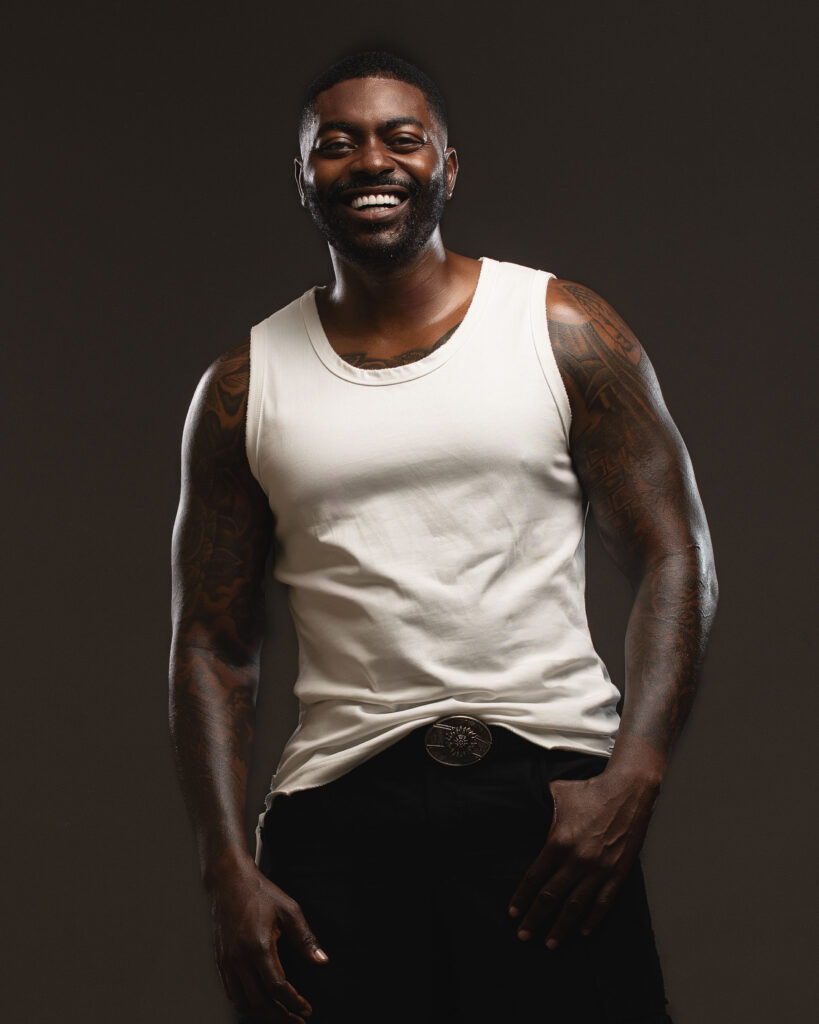
What are your thoughts on the current state of Nollywood? What excites you, and what do you think needs to change or improve?
So, the current state of Nollywood right now, I would say that, as I always say, and this is not because of public or whatever, I always show so much appreciation in my heart, from the bottom of my heart, to our predecessors, you know what I’m saying? People who have come before us, especially those who are late, who did not even stay up till now to enjoy most of the things we are enjoying now. Without them, there wouldn’t have been anything for us today to all gather and share. I also always give a shout out to even some of my colleagues, like my peers, people who are not too old, way older than me, people who are like my age mates and all of that, who stayed back.
You know what I’m saying? When people like us were not here and, you know, they were still pushing Nollywood and they pushed it to a level that it became attractive enough for people like us to say, oh, let’s go back home now for Nollywood. They’ve done amazingly well. So with everything going on in the industry, we must always still be appreciative of where we have gotten to. The journey has been so long and today we have something solid that we all look up to, right? The only thing that I would say is that I think the gatekeepers are the ones who should just be truthful to themselves, to not let power, ego, that part where they begin to put their own self-interest above the art, because they are major custodians of the art, and art is spirit. They should not disrespect art. Art is God’s gift. So, they should, for Nollywood to go to where we really want it to get to, look at what is happening at Afrobeats.
Afrobeats is having the breakthrough, because if Sony Records wants to deal with, maybe, Burna Boy, they will go to Burna Boy and his team. If, maybe Empire Records or Rockafella or something maybe they want to deal with Olamide now, they will go to Olamide and his team directly. But in Nollywood, it’s not like that. When the big things come into the industry, they go to certain people, and those certain people are the people that should please let start using their church minds more to put their selfinterest.
I don’t want to say selfish, but their own interest, they should put it aside, and they should always let art prevail. E.g., let’s give things to people that really deserve those things, because we know they can actually deliver those things. Not because, oh, this person is my person, or these are the people we party together, or these are the people that we wrote together, or whatever. If we can put aside all our selfish interest and our own differences, and we all focus on the arts, we would be surprised how big Nollywood has already become. We already have everything we want. We just need to, put all these differences aside and always think about the arts. I will work perfectly well in this industry with someone that I’m not cool with, because of the projects, because I want to make sure that the project is executed. I know, yeah, we’re not friends, or I’m nobody’s enemy, I don’t hate nobody, I don’t have bitterness in my heart for anyone, but I’m just saying, even if I know that we’re not cool, but art brings us together in this industry, we are going to do that stuff. So, that is what we must always put first in any decision we make in terms of taking Nollywood forward. You see all this Netflix, Prime Video, all those things we’ve been hearing, which we are not really sure of, but we’re just hearing things, it’s just a phase.
As Nigerians, I know we always conquer. I know we always rise above challenges. I know it won’t be long before there will be bigger things, and even greater than what we’ve seen before will come now.
It’s important for players to position themselves in the right places, so that when these blessings begin to come, it will fall into the right hands.
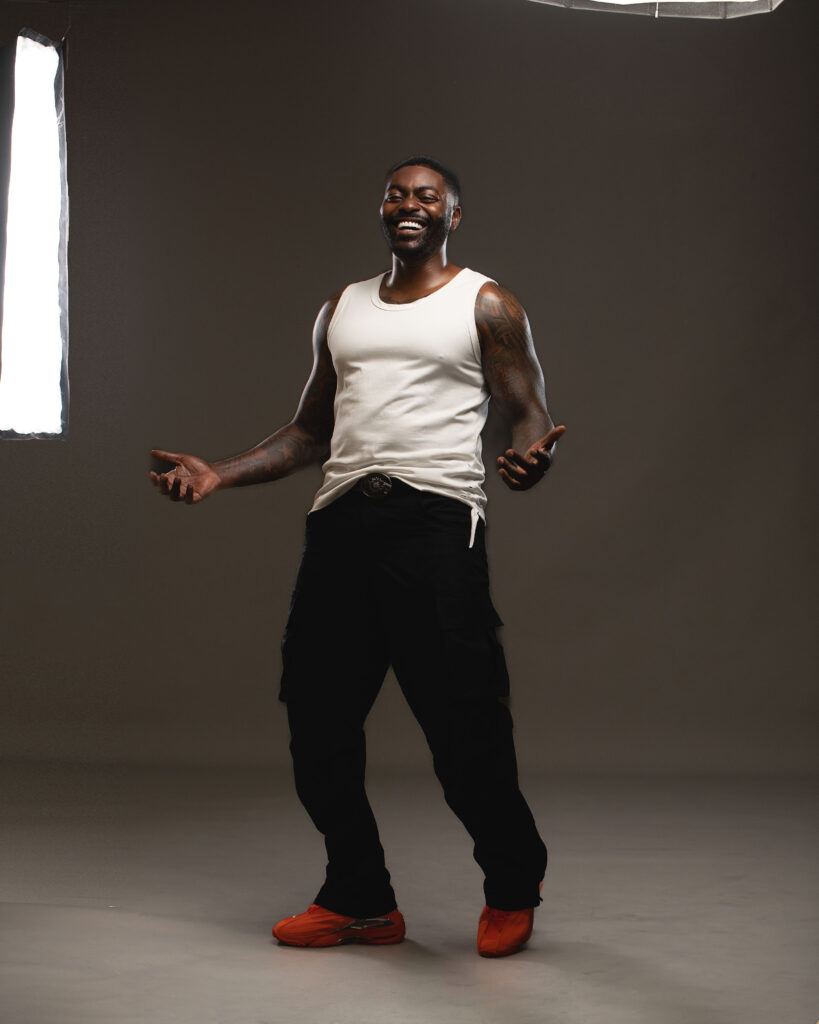
In your view, do you think Nollywood is doing enough to position African stories for the global market?
We are doing enough.
Definitely, we are doing enough. I promise you. People are suffering to make films. Sometimes, there are many things that actually work against filmmaking in Nigeria, that mouths may not be able to explain, except you get into it, then you experience it by yourself. Even some content that people will see, and they’ll feel like, ah, this nonsense content. People may have broken bones and lost some blood to create that. Do you get what I’m saying? So, people are really, really trying. We just need to keep trying more. To be more original, we should stay away from making content that look alike. Yoruba, Igbo, Hausa, all our cultures. Let’s say I, as a Yoruba person, now, if I speak for my language and my culture, I can tell you that our culture and language are as colourful as our masquerades. It’s too colourful, like a rainbow, different colours.
That means we can tell our stories in different ways. Same genre can be interpreted or expressed in different ways. So, we should stay away from copying. Personally, when I want to play a role, everything I’m preparing for that role, I’m preparing it against the last role or the other roles I’ve played. In my mind, I’m thinking, I did this in that role, I don’t want to do it in the next role, so I won’t be tagged as the actor that is always doing this or that is always saying this. So, even me, I stay away from copying myself or repeating what I’ve done. So, people should refrain from repeating what others have done. Just come out with original stuff and add it to your own storytelling and artistic expression. But in all honesty, people are really trying. We just need to add a few touches here and there.
You’ve become part of the “next wave” of Nollywood stars. Do you feel pressure to lead, or are you more comfortable just doing your thing and letting the work speak?
Anyway, my answer to that would be that I started my career as a model, right? And my years of modelling in South Africa, coupled with the type of confidence that I have from my ancestors, my lineage, you know? And the pride of a Yoruba man, and another thing is that I am an Oyo. I want you to remember this key point. I am a bonafide son of Oyo land. And there is a saying in Oyo that says, “Aji se bi Oyo lari, Oyo o nkin se bi babanla enikan”, It means people would rather copy Oyo, Oyo would never copy anybody else. I am so confident. I’ve made money with my hair. I’ve made money with my toenails. I’ve made money with every part of my body. I’ve been celebrated. I’ve sold looks for years. I’ve sold talent for years. I’ve seen that it is like an ocean. You can never say you are the one that will have it all. But that which you have is what you must amplify. So, I’m a man that knows himself. I know what I carry. I know it’s different. I know what I carry is not in the hands of just anyone but me. I know I’m different. So, I don’t compare myself to anybody. I’m doing my own thing, you know? If you check my socials, my activities, you will know that I’m ambivert. When I want to be outside, I’m outside. When I’m done being outside, I come back inside. And in terms of maybe ratings, I’ve been here many times. You know, when I see a list of most handsome men in Nollywood, and I won’t see my name, and I will smile. And I’ll be like, all these people, where were they when we were modelling in South Africa? For you to make it out of Nigeria to model internationally, you must be really special. So, I’m thinking, okay, no problem. But what I know is that when we meet in real life, the people who are rated, rate me. That’s all that matters to me. All the rated people, they rate me because they know me more than even the people maybe doing the ratings or the masses. But with all that being said, I rate myself. I give myself awards. There have been times when I was not even noticeable. Imagine, how did I come back up? Do you know the pressure of being in the limelight, and then something happens, you are no longer in the limelight. Everybody will change on you. Everything will change around you. Everything will keep reminding you of your downfall. It could be depressing. But only special people can make it up. So, even the people who have not fallen before, the people who have never, you know, fallen off before, that they just started and things are going smoothly for them, you know, because people have different ways of sustaining themselves. It’s not every sustained people who are doing positive things to stay up there. So, but you see, the hardest part is not falling off and then being able to come back. So, you have to be really, really special to have that. So, when nobody cared about me, when nobody was clapping for me, I just focused on my family members who gave me enough love and support and prayers, and they were cheerleading me, and I was clapping for myself, giving myself the confidence and everything. So, that’s still my MO till today, you know? I’m my number one fan, you get what I’m saying? I push myself. I praise myself. I develop myself. I criticise myself. I don’t tell myself lies, you know? So, I’m a man of my own, but I’m a good collaborator. That doesn’t reduce that at all. I just finished producing a film, a series, actually, a four-episode series, Bodija. I produced it with my director, Taiwe Egunjobi, who is the director of my latest and the biggest, best film out of Africa right now that is on Prime Video, The Fire and the Moth, with the same production crew and everything. I have an amazing family. I have an amazing bond with people that I work with. That’s the reason why we were able to come back for a reunion to do another project. So, I’m a good collaborator. But when it comes to my drive, it’s from within. It’s from within. Not from the outside.
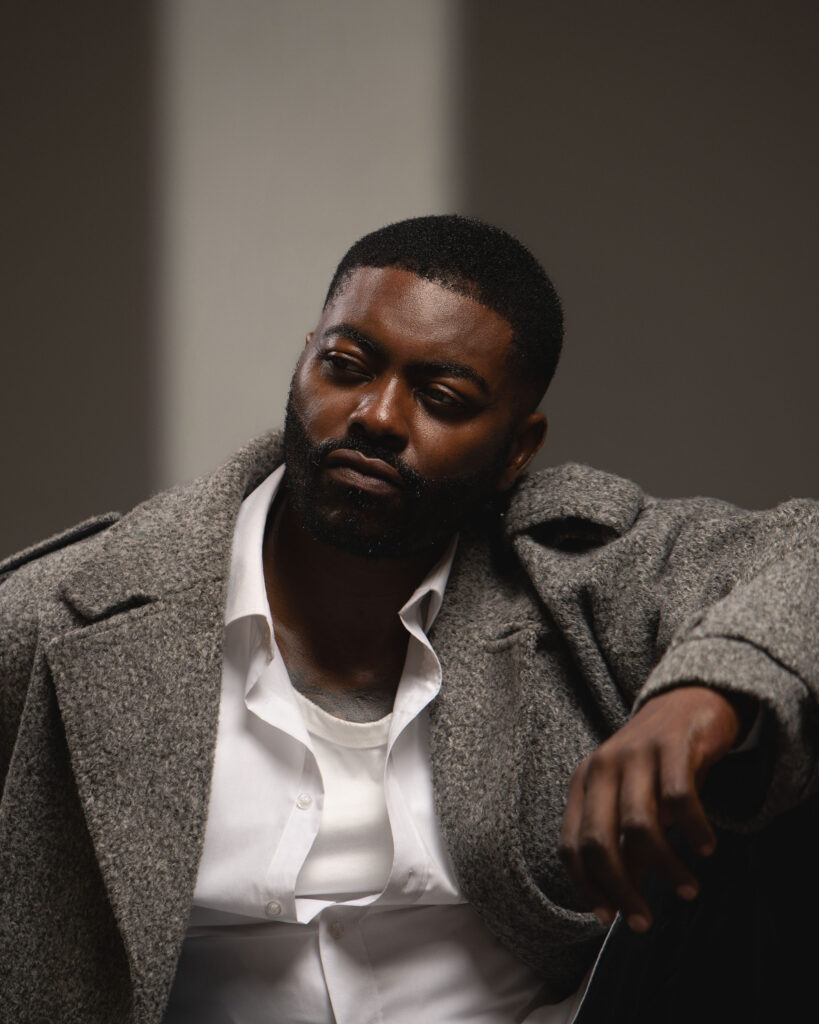
What keeps you grounded despite the fame and visibility you’ve earned over the years? Is there a routine or principle that helps you stay true to yourself?
So, what keeps me grounded is home. You know, when people look at me with tattoos and everything, I’m westernised. But, I’m a country boy. I’m from a community. I’m from a place where a family’s reputation is important. So, that keeps me really grounded. I remember when I was leaving for South Africa. My mom gave me a Bible and then my father told me, “Remember the son of whom you are”. And that word alone is exactly what it means when they say, half word is enough for the wise child or something like that. So, anywhere I am, before I do something, I’ll think about where I’m from. I’ll think about who I am. Because home is who I am. My foundation is who I am. So, I’m going to think about certain things. It doesn’t mean that I’m uptight. Today my father is late. So it’s a choice for me. It is who I am, that’s how I am, to follow the rules, to follow what seems right, to my parents, to my ancestors, most importantly. There are things that I do today that are new. There are things that maybe I change my mind on, maybe because I get to know more or got access to some understanding or knowledge that maybe they didn’t explain to me that time or maybe did not even exist during their time. I pick it up and I weigh it. Will this spoil my Omoluabi code? No, it won’t spoil my Omoluabi code. Okay, well, yeah, then I’ll add it on to it, you know, but most importantly, in everything I do, I always think first about my family name, about how my father would react to this thing.
What kind of roles or stories are you looking forward to exploring in your career? Are there any dream collaborations or genres you’re drawn to?
I’m a lover of different genres of film. I’m a very versatile actor. I can’t be boxed. I play different roles. Some films are still coming out. So, I look forward to iconic roles still. I’m not a quantity person. I’m a quality person. So, I may wait for one quality thing, but I like iconic roles, roles that will be celebrated, roles that would bring legacy to my name, you know, that even forever, people will always be talking about that role. Those are the types of iconic roles that I look forward to playing in my career.
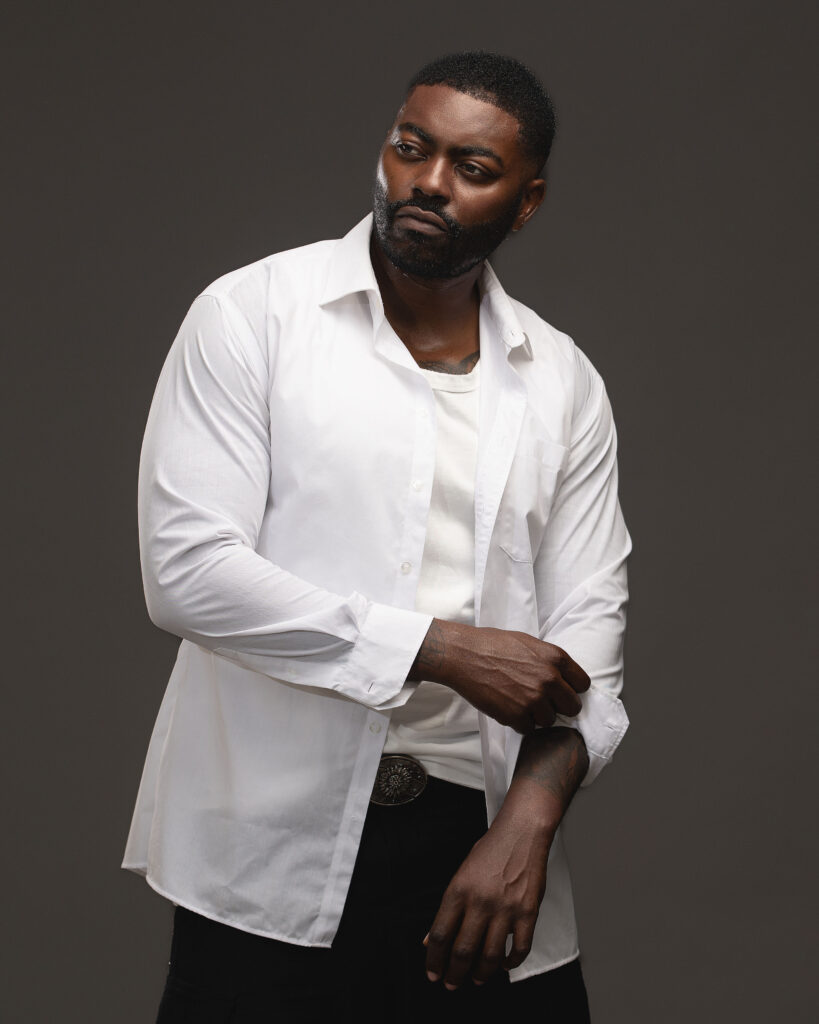
Beyond acting and producing, what creative itch are you yet to scratch?
So far, I have only produced movies. My first production was Man Like Jimi. It’s on Ibaka Tv and then, my second film production is this one I just finished. The one that’s titled Bodija, directed by Taiwo Egunjobi. It is a masterpiece. I promise you, people will love it. We have so many amazing characters in this film. So, with directing, I think for now, I found a director. You know, I’ve worked with a lot of directors who are really great. But at this time, I think Taiwo Egunjobi is a director that has been able to impress me. You know, he has been able to impress me. And not only that he has been able to impress me artistically, he has also been able to impress me with his job ethics, you know, his approach to life. He’s a very simple person. Taiwo is someone whose ideologies come with peace for me. And above all, we have a very solid mutual respect. Because Taiwo is like a younger brother to me. His older brother and I were friends in school, so there has always been that respect, and there’s always going to be that respect, about this is my older brother. And me too, I respect him because in production, the director is the boss to the actor. So, I always give him the respect of my boss, alright. There’s that mutual respect. So, when we create, we create together effortlessly and most importantly as well, we have a similar vision of, you know, working from our state, you know, also trying to export content from our state, my state, Oyo state, to make sure that we also have a major table in African entertainment industry. You know, so, all of these things put together, I can say that I’m not in a hurry to learn directing. If I want to direct, I have Taiwo and I have access to a lot of fantastic directors, you know. Kunle Afolayan is there. Bro Bayo Tijani is there, he is also my brother from Oyo state. The list goes on and on. So I don’t think, I am in a hurry to direct now. I just want to be producing, I have directors to work with already. But in the near future, you never can tell. When I am ready, I will make sure I got to the school for it. I will make sure I learn it properly before I venture into it.
What’s the boldest career risk you’ve taken so far, and what did it teach you about faith, failure, or freedom?
The biggest career move that I made was actually relocating back to Nigeria for Nollywood. Look whoever has not lived outside of Nigeria before would not understand how difficult it is. Or it would be for someone to say you are living in a beautiful place, a place that is as beautiful as the heavens. To want to relocate, our home is beautiful, no doubt, but we all know what we’re talking about. That coming from like a place where you are most comfortable, back to a place where you are not sure of your comfort. Why do you think people lose their minds when they get deported? So, it wasn’t something that is easy that someone would just wake up to do. Except you know that coming back home is a move for you to come and chase something bigger or something that will take you higher in life. So, I made that career move even though I wouldn’t undermine or I wouldn’t downplay the effect or the effort of my ancestors also, you know, in making sure I relocate back home. You know, something happened when I had the police harassment experience in South Africa, that to me was my ancestors slapping me out of my comfort zone. Because that was when my heart shifted from that place in South Africa. Otherwise, I swore that I would live the rest of my life in South Africa. That’s how much I fell in love with the place because of how much peace I found living there. But I came back to Nigeria. When I was coming back to Nigeria then that was my faith knowing that I’m going back to my home no matter what. I cannot fail. It is home for me to always be home for me. That is my foundation. I can never fail. So, that’s my faith that if I can make it outside of my land, what would it cost me to make it in my own land? You know, that is my land. So, that is my faith. And because I had that faith in God, because I had that faith in my ancestors, I got back home and I can promise you that ever since I got back to Nigeria, every second that I’ve lived in here has been blessed by God’s divine peace and glory and joy. He blesses me. He supports me. He takes care of me. And I can say that today I can beat my chest that there is no place like home. Now, the reverse is the case. There is nothing that can make me leave Nigeria and say I want to relocate completely because I’ve tied down so much here now. I’ve invested so much here now. Now, failure was what I should also, I could also have been afraid of. But that was the first thing I embraced because when I got back home, that was the first thing everyone, almost everyone reminded me of. They all reminded me that you are no longer where you used to be. Your things have changed. Your things have moved on or blah, blah, blah. That was what most people reminded me of. So, I felt that failure. I tasted that failure. But I embraced the shame. And I thought I’m going to take whatever shame comes to me as far as I conquer this failure and I turn it into a win and I started pushing. And then freedom. Freedom for me today means that I know that there is nobody today that is alive and has experienced Tayo Faniran on the screen that will not testify to the glory of God in my gifts as a screen god. It is a divine, you know, haters can hate, you know, people can MP. your enemy can never get a very massive kill as a hunter. To me and to people that have brain, people that have eyes that can see, they know today that I am already in the path, you know what I’m saying, to being an icon, a name that will live forever in the film history of the world. You know, and that gives me so much joy. That is the freedom that I have. That I already have something tangible in my hand, I just need to keep working on it and developing it. So, as long as the talent is mine, my gifts are divine. My force, the force that pushes me is either the divine one that people can’t see or the one that divinity has put inside me, that God has already created inside me, that is pushing me. So, which means it is going to create a supernatural effect. Hence, I told you in the beginning of this interview that it is not me. I think the story has been written. I’m just an author, I’m a character in this story, you know, but I’m grateful to God for the character He has given me to play because I’m really enjoying it. I’m enjoying it right now.
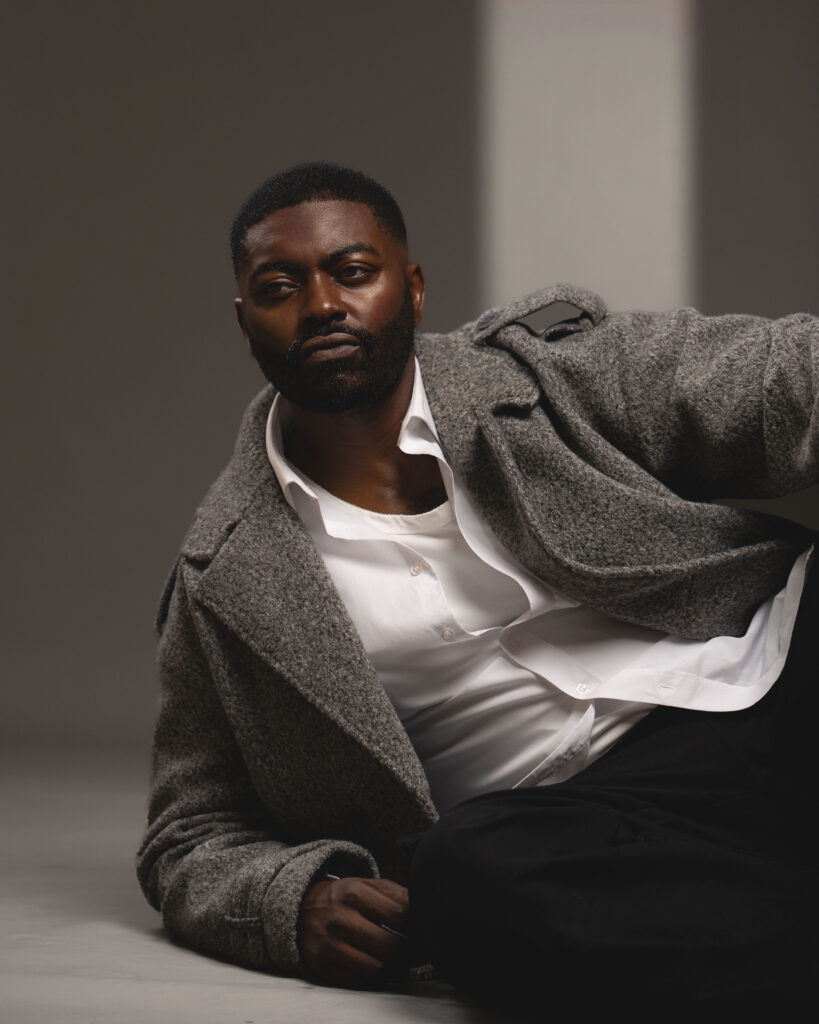
What do you want the younger generation to learn from your journey that you had to learn the hard way?
So what I want the younger generation to learn from my journey is for them to be original. Whatever you become starts from when you are young. So, a lot of people because they want to follow trends, a lot of people because they want to follow the new wave of education, they will switch completely from who they were originally. They will just become someone new completely. And what happens to the person that you were originally? The person is dead. That is not good. I’m a living testimony of the fact that originality pays. When I was growing up in Oyo, I had friends who never used to speak Yoruba. We had some kids in our school who thought that speaking Yoruba makes you local. I embraced speaking Yoruba. I embraced being cultural. I was fine. Don’t let me swear. I was too fine. I had too much swag. They could not resist me. In the coolest way that they want to think that is what is cool, they could not outshine me. But at the same time, I also held my cultural beliefs and traditions. I held them also dear to my heart. So, I was rubbing it in their faces throughout the journey of my life. I never dropped it. When I was in South Africa, I would be speaking Yoruba. My friends would gather. Even some were Yorubas as well. They just could not speak Yoruba or they did not understand Yoruba as much as I did. So, they used to enjoy sitting and listening to me speak. I held on to that identity of who I have been from childhood. I never let it go. I look at it today. I’m milking it. It’s a treasure that I have to milk today for the rest of my life. Because I kept on developing it and I never broke that bond. Same with my talents as well. Today, you find me, even with my complexion, you can’t find me using tanning lotion or tanning oil versus some people would want to bleach their skin. So, I’ve always held on to my dark skin. Tall, dark, handsome man. That’s my MO. I didn’t want to lose that. So, sometimes when I feel like maybe being inside the AC too much or going for spa treatments too much is making you look too fresh, I stay away from those things a little bit. I try to do some hardcore things a little bit just so that I maintain that fanboy appeal. That strong, typical, real African man appeal on the screen. So, I want the younger generation to also learn to develop themselves because I can beat my chest in the West, in the South, in the East, and in the North because I’ve earned it and I’ve proven my point over and over again and I’ll still keep proving my point over and over again because I’m original. In fact, I’m only scratching the surface in terms of the gifts that God has blessed me with. So, originality is key and I develop my originality, I develop my gifts in such a way that today I know that when I’m beating my chest, I’m not an empty barrel. So, they must always find originality so that even when they don’t speak, their gifts will speak for them.
PHOTOGRAPHY: AYOMIDE POPOOLA | INSTAGRAM @popsshotit
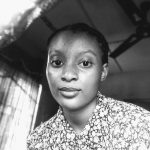
Dorcas Akintoye is a versatile writer with a passion for beauty, fashion, relationships, and culinary delight. With a keen eye for detail and a passion for storytelling, she adds a touch of elegance to every topic she explores. She is a writer at THEWILL DOWNTOWN.


